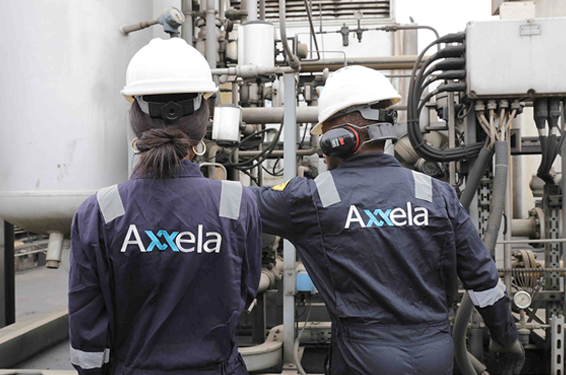Energy
Alternative energy: FUD wins N200m research grants
By Umar Akilu Majeri Dutse
The World Academy of Science (TWAS) based in Italy and the African Academy of Science based in Nairobi, Kenya have given the Federal University Dutse a grant of N200 million to carry out research on hydrogen (solar fuel) through splitting of water as an alternative to fossil fuel (petroleum) in Nigeria.
The World Academy of Science gave the university $59,930 (N42,849,950 million) while the African Academy of Science gave the university €220,801(N157,872,715 million).
The total amount is N200,722,66 million.
The leading researcher Dr. Hafeez Yusuf Hafeez of the Physics Department, Federal University Dutse said the research proposal that won the TWAS award is titled “Development of Efficient and Robust graphene based photocatalysis for the production of solar fuel (hydrogen) via photocatalic water splitting) while the title of the proposal that won the AAS award is “Development of Efficient and Robust mxene based photocatalysis for the production of solar fuel(hydrogen) via photocatalic water splitting.”
Dr. Hafeez said four MSc students will be trained under the TWAS research grant while six MSc students and two Ph.D students will be trained under the AAS grant.
He said he was motivated to carry out the research into this new area because of Nigeria’s over dependence on fossil fuel (petroleum) even though there is abundance of solar light and water in country adding that this research is an extension of his Ph.D work in India which the Indian government are now exploring at the commercial level.
The lead researcher said the world is now moving towards hydrogen energy due to its high combustion, zero emissions and it has the highest energy content (~150 kJ/Kg) compared to others such as petroleum, diesel etc, adding that it is the cheapest source of energy because it requires only water, solar light and suitable photocatalyst.
He said Nigeria will be the first country in Africa that will explore hydrogen energy as alternative source of energy and FUD will be the pioneer Cenntre of Hydrogen Energy in Sub-saharan Africa and Africa at large.
Dr. Hafeez said G-7 countries are leading in hydrogen energy especially USA, Japan, Germany, Canada, UK adding that USA, Japan and France have launched hydrogen trains and cars recently while Germany and Canada are generating their electricity via hydrogen energy.
According to him, the TWAS research is for a two-year period while that of AAS is for a period of four years adding that part of the grant is to establah a research lab at FUD which they are working on.
Other members of the team are Dr. Jibrin Mohammad, Prof. Abdussalam BAlarabe Suleiman and Prof. Chifu Ebene Ndikilar.
The Vice-Chancellor, Prof.Abdulkareem Sabo Mohammad congratulated Dr. Hafeez and his team for their pioneering research on hydrogen energy in the country adding FUD is proud of them.
The VC said the university is ready to support its staff at all time to engage in research that will benefit the host community and the country at large.
Energy
FBN Holdings share price gain N1.85, as investors renew interest
Energy
Axxela announces to develop 50 MMSCF/D gas processing plant


Axxela Limited, a leading gas and power portfolio company in Sub-Saharan Africa, announces that it has taken Final Investment Decision for the development of a gas processing plant situated in OML 56, Delta State, South-South Nigeria.
This strategic investment marks yet another significant stride towards delivering on Axxela’s commitment to deepen domestic gas utilisation in Nigeria. The gas processing plant with a total capacity of 50 MMSCF/D will be delivered in phases.
The first phase will comprise a 12 MMSCF/D modular plant, with an interconnection pipeline network of about 4km alongside other ancillary infrastructure. The facility is expected to commence operations by the end of 2024.
Speaking on this pivotal landmark, Director of Business Development, Axxela, Franklin Umole said, “As the Federal Government continues to pursue its Decade of Gas and Energy Transition Agenda, we remain a reputable private sector partner with the capacity to develop gas processing plants aimed at tackling the longstanding challenge of gas flaring and commercialisation in Nigeria.
“We are positioning to develop requisite infrastructure for natural gas processing and last mile distribution that creates market access for at least 20% of Nigeria’s gas demand.
“Over the past two decades, we have been at the forefront of natural gas advocacy, and this project is a further reaffirmation of our dedication to gas infrastructure development and our vision to deliver innovative energy solutions across Nigeria and Africa,” he concluded.
Following the Board’s Final Investment Decision, Axxela has executed a long-term feedstock supply agreement with a leading indigenous upstream player and established equipment supply arrangement with world class Original Equipment Manufacturers (OEMs) to assure quality delivery of the project. The design concept is based on a fast and modular expansion as Axxela is partnering with OEMs who have ready stock of equipment for deployment.
The project is strategically cited in OML 56 to serve as a potential hub which upstream players with fields within a 30km radius can partner with to process associated and non-associated gas.
Axxela believes in the potential of this central processing hub having identified two prospective fields and with the partnership with the OEMs, the company envisages that the plant’s output can be scaled up to 50 MMSCF/D within 18 months.
Beyond unlocking economic opportunities, the project can potentially transform gas flaring into a valuable resource that will further ensure a stable, cleaner energy for domestic utilisation thereby contributing significantly to annual CO2 emissions savings and supporting environmental sustainability.
Upon completion, processed gas from the facility will be readily available for utilisation across various market segments including Compressed Natural Gas (CNG) for vehicles, feedstock for industries, decentralised power solutions among others.
Energy
Electricity supply: Power Minister decries activities of saboteurs, cartels


The Minister of Power, Mr Adebayo Adelabu, has decried the activities of saboteurs and cartels in the electricity sector, blaming them for the incessant power outages in the country.
Adelabu expressed this during a programme tagged “Confronting Nigeria’s Power Challenge as the Nation Migrates to a Multi-Tier Electricity Market” on Tuesday in Abuja.
The programme was organised by the House of Representatives Committee on Power.
The Minister said saboteurs and cartels perpetrated evil for their selfish interests in order to frustrate efforts at ensuring stable electricity supply in the country.
“We have saboteurs, cartels, and those who prefer to perpetrate evil for their selfish interests to frustrate our efforts,” Adelabu said.
He said all efforts must be geared towards propelling the country to the league of productive nations, adding that Nigeria was looking at reserves that would eliminate incessant power collapse.
He said the Federal Government was considering the liberalisation of the power sector.
“We also encourage the state government to invest in power generation in their states,” the Minister said.
Adelabu listed Abia as one of the states that had invested in power, adding that the Federal Executive Council (FEC) had also granted Ekiti and Enugu State the right to generate tariffs.
The Minister said it was worrisome that a lot of investors did not come with their private equity, but had to borrow money from the bank to operate in the sector.
He, however, said that with time, investors would be made to operate the right way for the benefit of the sector.
The Minister also said that FG was looking at deepening rural electrification, adding that it would be done in collaboration with the state governments.
Adelabu said there were over 100 uncompleted power projects across the country, adding that those projects would not be energy-efficient without being completed.
Speaking, Group Managing Director, Sahara Power Group, Mr Kola Adeshina, expressed the regret that Nigeria could not supply electricity efficiently in spite of its abundant gas resources.
He said if electricity was not a priority in budget provision, it would be difficult for the country to work.
Adeshina said Nigeria had the resources to double its power generation.
“If the executive brings an appropriation bill before you(lawmakers) and the power sector is not number two after defence, then don’t allow it,” he said.
He urged the government to prioritise industrial areas in power distribution.
“After the industrial areas have had light during the day, we can shift power at night to residential areas because production takes place during the day.
“Let’s sequence our investment along the line of value-added. Nigerians are resilient, we are strong, and we have tenacity. Nigerians are tired of power collapse,” he said.
-
Finance3 months ago
Court orders Sen. Victor Umeh to repay N136m bank debt to AMCON
-



 Abuja Update2 months ago
Abuja Update2 months agoUNDP, FG partnership needed to achieve inclusion, equity- Minister
-
Abuja Update1 month ago
Banks drive stock market performance with N147bn gain
-



 Infotech4 weeks ago
Infotech4 weeks agoWorld Backup Day: NITDA urges Nigerians to ensure backup of data
-



 Health1 week ago
Health1 week agoCapacity training will reduce migration of health workers- NPHCDA
-
capital market2 years ago
Rt.briscoe, FBNH, Others halts negative performance of stock market
-



 Health3 weeks ago
Health3 weeks agoImmunisation: FG, GAVI seek synergy with Sokoto Govt.
-
Infotech2 weeks ago
Forex for Beginners: Unveiling the currency exchange and how to trade it





